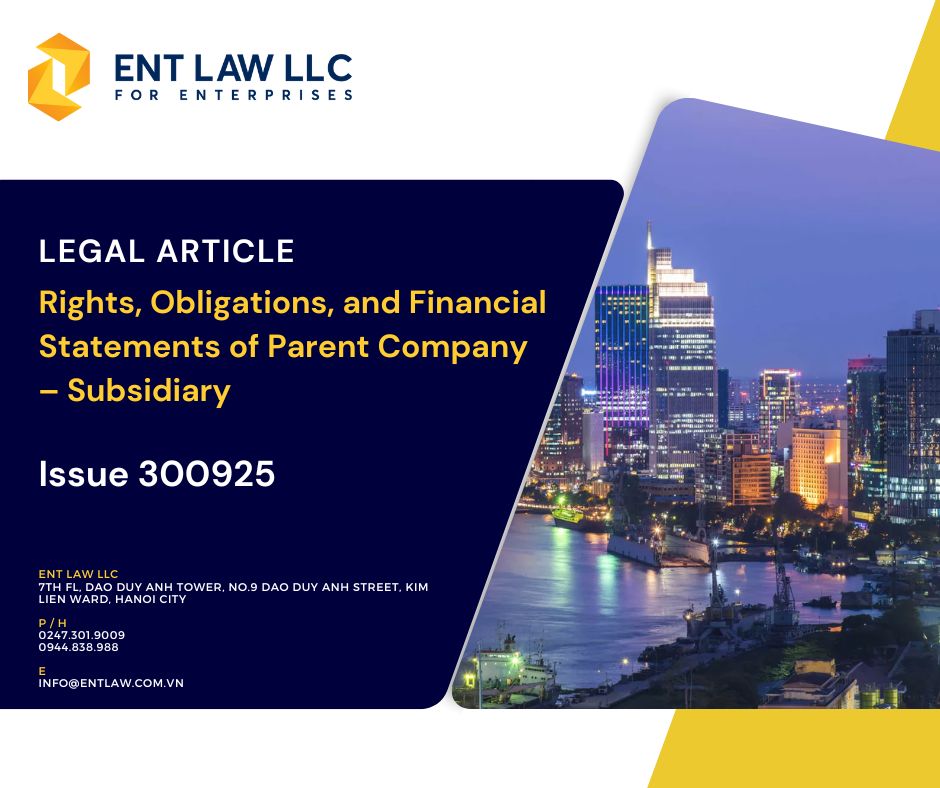Dear Valued Clients,
In the context of the development of economic groups and corporations in Vietnam, the parent–subsidiary relationship has become an important legal mechanism to concentrate resources, allocate capital, and control corporate governance.
To better understand the rights and obligations of parent–subscriber companies as well as the requirements for financial statements, our Clients may refer to this article.
1. Parent–Subsidiary Relationship
According to Clause 1, Article 195 of the Law on Enterprises 2020 (as amended and supplemented in 2022 and 2025) (“LOE”), the parent–subsidiary relationship is established when one company has the ability to control another company. Specifically, a company is considered a parent company if it falls into one of the following cases:
- Owning more than 50% of the charter capital or the total ordinary shares of another company;
- Having the right, directly or indirectly, to decide on the appointment of the majority or all members of the Board of Directors, the Director, or the General Director of another company;
- Having the right to decide on amendments or supplements to the Charter of another company.
2. Rights of the Parent Company over the Subsidiary
The parent company has the right to control the subsidiary through forms of capital ownership or control rights, thereby giving rise to certain fundamental rights such as:
- Voting rights corresponding to the ownership ratio in the subsidiary, including the right to participate in decisions on matters within the authority of the General Meeting of Shareholders/Members’ Council.
- In case of holding controlling rights, the parent company may directly or indirectly decide on the appointment of the majority or all members of the Board of Directors, the Director/General Director of the subsidiary.
- The parent company may orient the development strategy, financial, and investment policies of the subsidiary, within the limits permitted by law.
3. Obligations of the Parent Company towards the Subsidiary
Along with control rights, the parent company must comply with the following legal obligations:
- The parent company shall not be liable on behalf of the subsidiary for financial obligations, except in cases where there is another commitment or where the parent company intervenes beyond its authority, compelling the subsidiary to operate for the benefit of the parent company or another entity, causing damage. In such cases, the parent company must bear joint liability for outstanding debts and financial obligations and compensate the subsidiary for losses.
- Contracts, transactions, and other relations between the parent company and the subsidiary must be established and performed independently and equally, under the conditions applicable to independent legal entities.
4. Financial Statements of the Parent Company and Subsidiary
According to Article 197 of the LOE, in addition to the obligation to prepare separate financial statements in accordance with the law, the parent company must also prepare three additional reports: (i) consolidated financial statements; (ii) a consolidated annual business results report; and (iii) a consolidated report on the management and administration of the parent company and its subsidiaries.
In the process of preparing the above financial statements, the parent company and its subsidiaries must comply with the following requirements:
- At the request of the parent company, the subsidiary must provide full reports, documents, and necessary information to serve the preparation of the consolidated financial statements and consolidated reports of the parent company and its subsidiaries.
- If the parent company has applied all measures within its authority but still does not receive the reports or documents from the subsidiary, the parent company is still required to prepare the consolidated report. Such report may lack data from that subsidiary but must be accompanied by explanations to avoid misunderstanding or misinterpretation.
- The person responsible for preparing the parent company’s reports may use the reports provided by the subsidiary, except where there are grounds to doubt their accuracy, truthfulness, or authenticity.
- Financial statements, consolidated financial statements, and consolidated reports must be retained at the parent company’s head office; copies must also be kept at the parent company’s branches in Vietnam.
- In addition to financial statements, the subsidiary must also prepare a consolidated report on purchase and sale transactions and other transactions with the parent company.
As usual, we hope that you find this article useful and look forward to working with you in the near future.
Sincerely,

 Tiếng Việt
Tiếng Việt


Issue of February 2026 – Decision No. 92/QD-BTC on enterprise registration and establishment procedures
Dear Valued Clients, The Ministry of Finance (MoF) issued Decision No. 92/QD-BTC (“Decision 92”) on January 19, 2026,...
Feb
Issue of January 2026 – Decree No. 20/2026/ND-CP Guiding Resolution No. 198/2025/QH15 on the Development of the Private Economy
Dear Valued Clients, Decree No. 20/2026/ND-CP (“Decree 20”) was promulgated by the Government on January 15, 2026, providing...
Jan
RECRUITMENT ANNOUNCEMENT
Position Lawyer / Trainee Lawyer(Priority given to candidates who are currently enrolled in or have completed the Lawyer...
Jan
Issue of December 2025 – Amended Personal Income Tax Law
Dear Valued Clients, The National Assembly of Vietnam officially adopted the Fourth Draft of the Law on Personal...
Dec